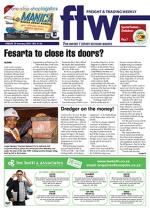There is likely to be a major
rethink amongst the airlines
about the trend to “all-in”
cargo pricing, according
to Alwyn Rautenbach,
executive manager of Airlink
Cargo and chairman of
the Air Cargo Operators’
Committee (Acoc).
This, he told FTW, was
likely to be triggered by
the massive drop in oil
prices, and the associated
reductions in aviation fuel
costs.
Fuel
surcharges,
according to
Rautenbach,
were originally
put into
practice some
years back
because of the
volatility of oil
prices. “But,”
he added,
“there had
been stability
in prices at
about US$105-
114 per barrel for Brent
crude for quite a long time.”
And this, in turn, led
to the increasing talk and
occasional action on airlines
implementing all-in pricing.
However, Rautenbach
said, things have once
again reverted to a volatile
situation. “And I reckon this
will lead to a rethink.”
But forwarders are still
adamant that all-in pricing
is the way to go, with the
mention of surcharges
being a very contentious
subject. They have called for
some considerable time for
surcharges to be removed –
claiming they were opaque
and complex. And this made
it difficult for forwarders to
quote a definite price for air
cargo transportation, which
the shippers were able to
understand.
Given this,
Fiata has
welcomed
statements
by some
airlines’ freight
divisions
announcing
their policy
to return to
a simplified
all-in rate
structure that
eliminates all
these various
surcharges,
such as fuel and security.
The body added that the
simplification of rate
structures would be a
significant benefit to
forwarders and shippers
alike.
Rodolfo Sagel, chairman
of Fiata’s Airfreight
Institute, was quoted in the
international press saying
that he believed this all-in
move by certain airlines
was “a long-awaited move
in the right direction
that may be supportive of
transparency”.
He also noted that Fiata
believed that this could be
the precursor to many other
airlines following suit.
Also there have been
lots of murmurings in the
freight trade media about
the fuel surcharge having
attracted significant
criticism in recent months
as fuel prices continued to
fall.
For example, grabbing
the surcharge bone of
contention was Paul
Golland, chairman of the
Australian Federation of
International Forwarders
(AFIF) and vice-chairman
of Fiata.
In a statement last week
he questioned why, with
fuel prices falling almost
50% a barrel, carriers had
been so slow in reducing
current fuel surcharges.
“Whilst it is appreciated
that the cost of aviation
fuel is not on a par with
standard fuel,” he added, “it
is still a mystery as to why
there has been no reduction
in fuel surcharges.”
Unfortunately, airlines
have been absolutely
non-responsive to this
statement.
But they have certainly
answered the question posed
in a slightly different form:
When would customers see
a reduction in rates, with the
fuel cost having dropped so
dramatically?
They won’t, according to
Peter Davies, former CE of
Air Malta, because “…prices
are market-driven not costdriven”
– adding that lowering
them was not necessarily the
correct response to lower oil
prices.
Also, Airwise News quoted
Ted Christie, chief financial
officer at US low-cost carrier
Spirit Airlines, saying that
airlines had “very expensive
systems and people thinking
about how to maximise
revenue, and they should do
that regardless of the oil price”.
But, benefiting from
cheaper fuel after crude oil
prices dropped 60% since
June last year, the global
airline industry is expected
to report a near US$5-billion
increase in profits this year to
US$25bn.
And so the bottom line
thinking by the Davies and
Christies of this aviation
world has been challenged
by politicians and consumer
groups in the US and Europe.
They have been calling in the
press recently for airlines to
cut prices.
New York Senator Chuck
Schumer, for example, called
for a federal investigation last
month into why lower fuel
costs were not being passed on.
But a consensus of aviation
experts remained adamant
that airlines were unlikely
to cut prices following the
dramatic fall in oil prices. And
again, “volatility” was the main
word bandied about in this
train of thought.
INSERT
Forwarders have for
some considerable
time called for
surcharges to be
removed — claiming
they were opaque
and complex.

